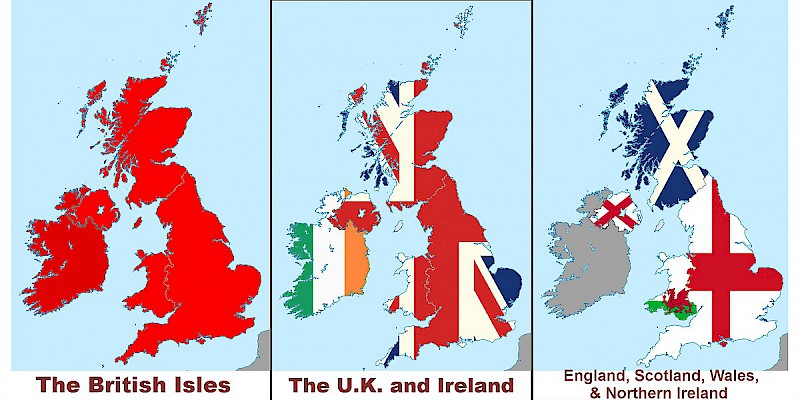Is it the U.K. or Great Britain? ★★★

So, which is it? "The United Kingdom" or "Great Britain?"
So, which is it? "The United Kingdom" or "Great Britain?" And is that a country or... what? What about England and Scotland? The British Isles?
Here are the answers.
The United Kingdom
The United Kingdom is the actual country—a constitutional monarchy, to be precise. The U.K. is ruled by a Cabinet of minsters, headed by and appointed by the Pirime Minster, all of whom are responsible to an elected Parliament.
There is also a Royal Family headed by (currently) a Queen, but the "ruling" monarch largely acts only as a figurehead (albeit an enormously respected one).
Legally, this nation is referred to in full as the United Kingdom of Great Britain and Northern Ireland—or U.K. for short. (Other acceptable nicknames: "The United Kingdom" or "Britain" or—if you're feeling particularly poetic, the Celtic-derived "Albion").
Wait, I though England and Scotland were countries...
The U.K. is quirky in that, though a country itself, it is made up of other, smaller countries, each with varying degrees of self-rule:
- England
- Scotland
- Wales
- Northern Ireland
However, these are not sovereign nations.
Officially, on the world stage (at the U.N. or Olympics, for example), the only country here is the U.K.
Aside from internal political concerns, fierce national pride, and Scotland's increasing closer votes to go completely independent, the only times you'll see England, Scotland, and Wales treated separately are in history books, travel guides, and at the World Cup (where they do compete as separate nations; FIFA is weird).
All U.K. citizens are called British citizens—though most will self-identify as Scottish, English, Welsh, or Irish (or Manx). There is no such thing as an "English" passport.
As a further note: Cornwall—the very tip of England's southwesternmost peninsula—also has a self-rule/greater autonomy movement of its own, and has been recognized culturally (not politically) as a distinct Celtic nation by various Celtic organizations as well as, since 2014, the Council of Europe.
So is the U.K. the same as Great Britain?
Now we are talking geography, not politics.
Most of the U.K. (overseas territories excepted) inhabits portions of a large group of islands called the British Isles, lying across the English Channel from France and the rest of mainland Europe, between the North Atlantic and the North Sea.
Great Britain is a geographic term that, technically, refers only to the largest landmass in the British Isles—the one made up of the largest, "mainland" portions of England, Scotland, and Wales.
In practice, "Great Britain" also includes the dozens of other small islands that are, politically, part of the U.K., from the Isle of Man to the Outer Hebrides. (OK, so the Isle of Man is actually a "Crown dependency"—a relationship a bit akin to that between Puerto Rico and the U.S.)
However, in everyday usage, "Great Britain" is yet another synonym for the entire U.K., even though Northern Ireland lies on a different landmass.
The British Isles
This is a contentious one, since "the British Isles" encompasses all the islands around here, include both of the big ones: Great Britain and Ireland.
So, geographically speaking, both the U.K. and Ireland are part of the "British Isles."
However, given that the term "British Isles" has the word "British" in it—and the citizens of the Republic of Ireland (and a good many in Northern Ireland as well) fought long and hard to become independent of the U.K. in 1922—it is not a term one would toss around casually in Ireland.
Wait, what about places like Bermuda and the BVI? Aren't they British?
The U.K. also has 14 Overseas Territories—mostly islands in the Caribbean, South Atlantic, and Antarctica like the Caymans, British Virgin Islands, Bermuda, and—controversially—the Falklands (Argentina lost a brief war in the 1980s to get those back).
I am glossing over things—and there are a few special cases, like the Isle of Jersey in the English Channel and the famous rock of Gibraltar between Spain and Morocco—but in general you can think of these Overseas Territories as analogous to American territories and protectorates, like Guam or the U.S. Virgin Islands.
What is this "Commonwealth" thing?
The Commonwealth of Nations is an association of the U.K. and 52 of its former colonies (the U.S. notably excepted), most of which still recognize the Queen as some sort of ceremonial figurehead of state.
The Commonwealth includes some major nations, including Australia, India, Canada, New Zealand, Pakistan, and South Africa, along with many Caribbean and South Pacific island nations and much of southeastern Africa.
The Commonwealth impressively extends to all seven continents, covers about a quarter of the Earth's landmass, and comprises about a third of the world's population—a testament to the former extent of the mighty British Empire at its height in the 19th and early 20th centuries.
Aside from a charter each country signs agreeing to govern under the rule of law (a few struggle with that one, frankly), the Commonwealth is largely a symbolic association—though they do throw their own mini-Olympics very four years called the Commonwealth Games.








